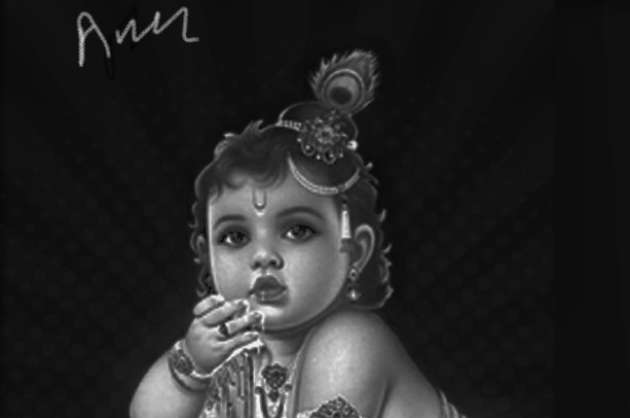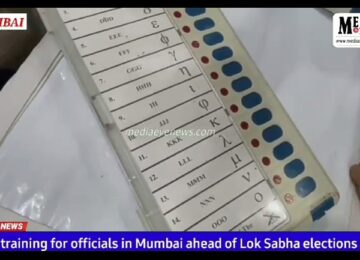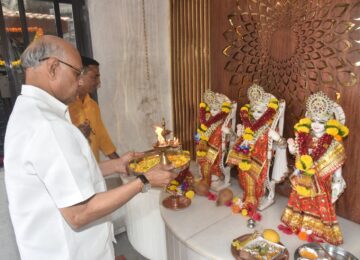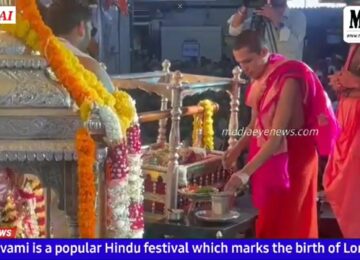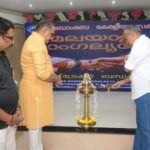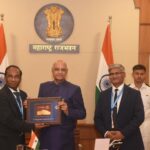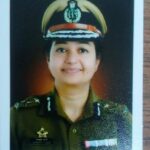Anupama Nair
There are many devotees who made the Temple famous. Let me tell you about them. Manjula was a virtuous girl. Every night she used to bring garlands for the Lord. One day she was late and the temple was closed. She was upset as she saw the closed doors of the Temple. Poonthanam, another devotee on his way back from the temple saw her crying near the banyan tree. He comforted her and said that she could place the garland on the stone at the foot of the banyan tree, as the Lord is omnipresent. She was convinced, and kept the garland there and happily went home. Next day morning, while the head priest was removing all the garlands from the idol, to his surprise he could not remove one garland that remained stuck on the idol. The devotees were puzzled but Poonthanam realized it was the garland, which Manjula had placed on the stone at the foot of the banyan tree.
Poonthanam then told the story to everyone and then the garland slipped down from the idol. Devotees started chanting the name of the Lord and struggled to collect the flower from the garland. Worshipers went to the banyan tree to make their homage. Since then, the banyan tree came to be known as “Manjulal”.
Once the priest at Guruvayur temple had to go out on an unavoidable journey, and told his 12-year-old son Unni to offer the Naivedya to the Lord and left. At the prescribed time he offered Naivedya to the Lord and thought in his innocence that the Lord will eat the rice, but the idol did not move from its place. Unni then went outside and brought some salted mangoes and curd from neighborhood in the belief that the Lord like food this way. He mixed the curd with rice and offered it again. But the idol was unmoved. He cajoled , requested, coaxed and in the end threatened , but idol still did not eat the food. He started crying on his failure and shouting towards the Lord that his father would beat him. The Lord was pleased by his devotion and ate the Naivedya. The boy left the place satisfied that he had done his job. When his father returned from his journey and asked him about the food, Unni told him with great happiness that that Lord ate the food. His father did not believe him and began to beat the boy. Then they heard a celestial voice stating, "I am the guilty, person and Unni is innocent".
One day a devotee wanted to hold a feast for the Lord with a hundred measures of rice. As per the tradition, the offering to the Lord was to be prepared by the two assistant priests. One of them was on leave due to illness. The devotee was worried and spent a sleepless night pondering over how to make the next days' arrangements. He could do nothing but pray to the Lord chanting His name overnight for a solution. The next day when he went to the temple, and was relieved to see the man, who had been on leave had returned and was preparing the feast. After the cooking was over, he went to take his bath in Rudratheertham and did not return. He was not seen the next day also. When the devotee made his enquiries, to his surprise he learned that the priest was actually bed ridden ever since he had been on leave. The devotee understood, it was my Lord Giridhara Gopala, himself who had come and helped him out of the difficulty.
Poonthanam was a devotee of the Lord who used to walk about 100 kilometers to take darshan of Guruvayurappan every month. Once on his way, he was attacked by some robbers. Sensing the danger, he closed his eyes and requested for Lord's help. After some time, he could smell the sweet scent of Vanamala (the garland worn by the Lord), and he opened his eyes to see Mangattachan who was the Minister of the Zamorin of Calicut standing before him with his drawn sword drenched in blood and also the dead bodies of the robbers around him. Quite relieved, Poonthanam cried out “Krishna!, your leelas are wonderful!”. He then took the ring off his finger and presented to Mangattachan.
The head priest of the Temple, the same night, dreamt about an Unni Namboodiri telling him "You will find a ring on the idol, give it to Poonthanam, who will come tomorrow". He was surprised when he saw a ring on the idol when he opened the temple the next day. Shortly Poonthanam came for darshan and started his prayers. The priest came out from temple and gave Poonthanam the ring and told him what had happened. Poonthanam was flabbergasted to see that the ring was his own, which he had presented to Mangattachan, the day before!. It was Lord Guruvayurappan himself, who came to the rescue of Poonthanam as Mangattachan.
The Jnanapana written in simple Malayalam is Poonthanam's greatest work. There was another devotee called Melpathur who was the most knowledgeable and learned man of that time. Poonthanam showed the draft of his Jnanapana to Melpathur. Malayalam was not accepted in the learned circle those days and Melpathur had contempt for Malayalam, which was not considered equal to Sanskrit. He refused to see Poonthanam's work and told him blatantly to learn Sanskrit and then start writing. This act of Melpathur hurt Poonthanam very much. Melpathur was composing Narayaneeyam in those days and when he came next day to offer dasaka of ten slokas before the Lord, he could not utter a single word. A small boy in his teens, never seen before presented himself and pointed out mistakes after mistakes in the slokas composed by Melpathur. After ten mistakes in ten slokas Melpathur realized the divinity of the boy. He felt at the feet of the boy but the boy disappeared and then a celestial voice said “Poonthanam's Bhakthi is more pleasing to me than Melpathur's Vibhakthi”. Melpathur realized his mistake and asked Poonthanam to pardon him and amended his arrogance by reading the works of Poonthanam.
There was another devotee by name Villwamangalam's whose devotion and dedication towards the Lord was such that he could have visions of the Lord, independent of the image. Wherever he went, he had visions. Whenever he came to Guruvayur for darshan, the Lord granted him vision from the sanctum sanctorum. One day however, he could not get the Lord's vision from the Temple. He went around the Temple in search of the Lord. The sound of tinkling of bells from the northern part aroused his curiosity. He saw the Lord Krishna dancing there. From that day onwards this place came to be known as Nritham.
A second time, also, he could not see the Lord's vision in the central shrine. Later he found the Lord sitting amidst the drummer's boys and sharing a feast with them, as the Lord was fond of food. It later became an important offering with the devotees. A third time also, he failed to have the Lord's vision in the central shrine. It was night time and the Krishnanattam was being staged in a courtyard. The saint ultimately found him on the stage with the 'gopikas'. Since then, Krishnanattam came to be staged in the northern bahyankana (outer courtyard) instead of the eastern bahyankana and, it began only when the central shrine is closed after the last pooja at night.
Kururamma was a childless widow. She adopted Unni Krishna as her son and gave him a lot of motherly love. Villwamangalam also saw the Lord in the form of Unni Krishna but the Lord always preferred Kururamma for her devotion.
Once an old Brahmin with severe stomach ache approached Villwamangalam for relief. Villwamangalam could not cure him and told that the pain is the result of his past karma. Dispirited and dejected he unknowingly reached Kururamma's house. Kururamma thought he was hungry and offered him some food. The Brahmin said that he could not eat any food because of his stomach ache, which even Villwamangalam could not cure. After listening to his grievances, she told the Brahmin to have a bath in the name of Lord. After his bath, he was served food. He realized that his stomach ache had disappeared. He ate the food and expressed his gratitude to Kururamma
One day when Kururamma was washing her clothes, a few drops of water unintentionally fell upon Chemmangatt Amma, another lady of the locality who had finished her bath. She felt polluted and took a second plunge in water to purify herself. She sarcastically told Kururamma that now she was doubly clean and stated that today Villwamangalam would be coming to her house for bhiksha. Kururamma sent a member of her family to invite the saint, but he apologetically refused since he had promised Chemmangatt Amma earlier.
After his daily worship, Villwamangalam started for Chemmangatt's house for the bhiksha. But the pilot who was to lead his way by blowing conch to announce his presence could not produce any sound from his conch. It was a bad omen and Villwamangalam was bewildered. Then he realized that it was the Lord's wish that he should go to Kururamma's house. When he thought, this the conch started functioning and filled the air with its resonant sound. The saint then turned his steps towards Kururamma's house. The Lord thus reveled his love to Kururamma.
What we need to remember, that my Lord said “patraṁ puṣhpaṁ phalaṁ toyaṁ yo me bhaktyā prayachchhati tadahaṁ bhaktyupahṛitam aśhnāmi prayatātmanaḥ” which meant “if one offers to Me with devotion a leaf, a flower, a fruit, or even water, I delightfully partake of that article offered with love by My devotee in pure consciousness”. This is all I understand and believe.

